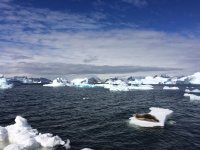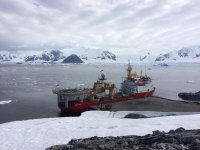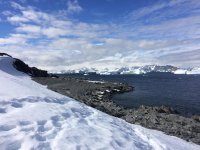New (2017) arctic exploration book, David Welky’s
A Wretched and Precarious Situation
https://www.amazon.com/Wretched-Pre...&keywords=A+Wretched+and+Precarious+Situation
Members of Peary’s 1906 attempt at the North Pole organize an expedition in search of “Crocker Land”, a mysterious landmass Peary “saw” in the distance, long surmised to exist because of tidal flow oddities between the Alaskan Coastal current and transpolar drift.
Spoiler Alert: There is no Crocker Land. Peary probably knew that from the get go, but couldn’t discard the claim because he was deep in the feud with Cook and needed Crocker Land as a fundraising tool. The tidal oddities are now known to be caused by the Beaufort Gyre.
The Crocker Landers endure everything you might expect from a questionably planned and poorly funded expedition to a land that does not exist. The expedition is dropped off south of their intended starting point, and on the West side Greenland instead of the Ellesmere Island coast, a planned two year trip turns into four, multiple rescue ship are caught in the ice and forced to overwinter before reaching the expedition (or the expedition them), infighting, insanity, a murder, scant supplies.
At one point members of the party are scattered to hell and gone in six locations, each making their own way and over-wintering along western Greenland. Just another effed up turn of the century polar exploration.
The actual sledging trip from Greenland onto the polar ice west of Ellesmere doesn’t happen until half way through the book and takes but a few pages.
Spoiler Alert II: MacMillan and company finally see the mountains of Crocker Land in the distance. Their Inuit companions shake their heads and say “No, mists”. Crocker Land is still visible the next day. Inuit’s still say “No, mists”.
Crocker Land vanishes amid clear skies on day 3. What is Inuit for “Dammit, we tried to tell you. Mists”
Criticism: Despite the rollicking subject matter Welky’s sentence structure was at times oddly unappealing to me. The book is well researched, well detailed and footnoted, but there are large parts with no “flow”, almost like reading a bad translation of Dostoyevsky. It seems like a book I couldn’t put down. I did a dozen times, returning for another push.
Or maybe it was just that I knew Crocker Land didn’t exist from previous Peary readings. And now I’ve spoiled that for you too.
Still a worthwhile read.
Antarctica concentrates meteorites... the space rocks fall onto a glacier year after year, are buried by snow, and hundreds of years later glacial flow brings them to the toe, where wind erosion exposes the meteorites again and there they sit accumulating in number until somebody might find them. The idea of finding a rock that's been orbiting around the solar system for billions of years before falling to earth might make one take a closer look... hmmm, what have we here, a moon rock?
A chapter in Gabrielle Walker’s Antarctica, An Intimate Portrait of a Mysterious Continent details one research station’s methodical snow machine grid-search for meteorites. IIRC some of that search takes place in “desert” regions of Antarctica that receive just a trace of annual precipitation. Interesting stuff.
One of my favorite tidbits from the other end of the earth is the Cape York meteorite in Greenland, once the Inuit’s only source of iron. How do you move a 68,000 lb meteorite in the 1890’s? Build Greenland’s only railroad.
A half dozen other pieces of that meteorite have been discovered so far, including a 44,000 lb chunk in 1963 and a 500 lb fragment in 1984.
https://en.wikipedia.org/wiki/Cape_York_meteorite
As Greenland melts I’m betting additional pieces continue to turn up.



